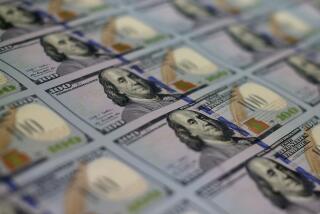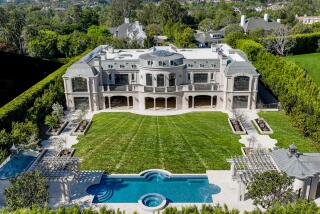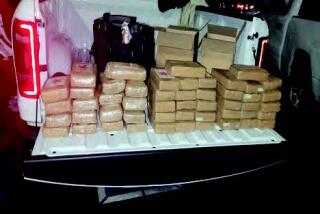U.S. Seeks $500,000 Share of Bus Terminal in Drug Money Case
- Share via
The federal government moved Thursday to seize a $500,000 share of the Greyhound Bus Terminal in downtown Los Angeles, alleging that the building was purchased in part with proceeds from a major international money-laundering ring.
In documents filed in Los Angeles federal court, prosecutors alleged that a Los Angeles businessman who is a partner in the bus terminal laundered millions of dollars in drug money on behalf of a Swiss currency exchange house that is one of the subjects of the largest money laundering operation ever uncovered in Switzerland.
Narcotics Proceeds
The businessman, Dickran Altun, is part of an organization that is suspected by federal authorities of dispatching an estimated $32 million in narcotics proceeds out of Los Angeles by way of private couriers on commercial flights, according to court documents.
Authorities in the United States and Switzerland say Altun was operating on behalf of a Lebanese couple, Barkev and Jean Magharian, who are under investigation in Switzerland for allegedly laundering the equivalent of 1.4 billion in Swiss francs through a variety of accounts, most of it through the Zurich office of Switzerland’s third largest bank, Credit Suisse.
Couple in Custody
The Magharians, who are presently in Swiss custody pending the outcome of the investigation, were named in an indictment returned March 8 by a federal grand jury in Los Angeles, alleging that they conspired with Altun to launder drug money and secretly transport it outside the United States.
Altun, who is named as an unindicted co-conspirator, is believed to be in the custody of Turkish authorities.
Assistant U.S. Atty. Gordon Greenberg said the Los Angeles connection came to light in November, 1986, when a suspicious airline employee at Los Angeles International Airport questioned three pieces of luggage bound for Zurich. Police found more than $2 million in the three suitcases, money which was eventually traced to Colombian cocaine traffickers, Greenberg said.
The indictment alleges that Altun passed large sums of drug money to a series of private couriers, who secretly carried it out of the United States aboard commercial flights to Switzerland. Once there, it was transferred to the Magharians, or their agents, who deposited it in Swiss and Panamanian bank accounts, according to the indictment.
Two days after the Los Angeles indictment was returned, a New York grand jury indicted the Magharians on charges of selling cocaine.
The money laundering investigation has generated a major scandal in Switzerland, prompting the resignation of the nation’s justice minister, Elizabeth Kopp, and the suspension of the attorney general, Rudolf Gerber.
Connection to L.A.
But the indictment and forfeiture action are among the first concrete connections to narcotics proceeds collected in Los Angeles.
Assistant U.S. Atty. Donna R. Eide, who filed the forfeiture action, said Altun has admitted his role in the money laundering operation in exchange for immunity from prosecution and also disclosed that $500,000 of the $900,000 he invested in the Greyhound terminal represented proceeds from his money laundering operation.
Altun was one of seven partners who formed Samko General Partnership in December, 1986, to purchase the retail and office building that contains the bus terminal for a reported $12 million, Eide said. Greyhound simply leases terminal space from the partnership, she said.
If the government is successful in the forfeiture action, Eide said, Altun’s partners could elect to pay out his $500,000 share.
Sale of Building
“If they refuse, one of our options would be to sell the building, take our $500,000, and the partners would get the remainder,” she said.
According to an affidavit filed with the forfeiture action, Altun has told federal agents that he was recruited to launder money for a Colombian drug kingpin known only as “The Doctor.”
Since then, federal authorities have learned that Altun shipped an estimated $32 million to the Magharians between March and November of 1986.
More to Read
Sign up for Essential California
The most important California stories and recommendations in your inbox every morning.
You may occasionally receive promotional content from the Los Angeles Times.










